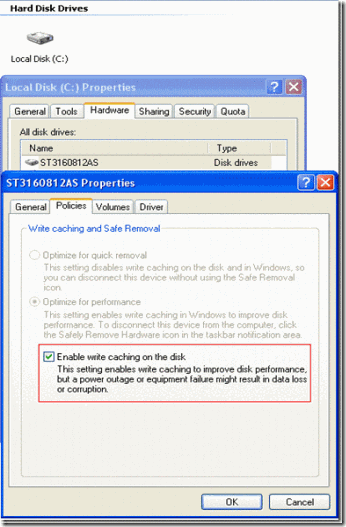Enable or Disable “Enable write caching on disk” behavior on disk
Couple of times I got a question to <Enable or Disable “Enable write caching on disk” behavior on disk>, How to do it programmatically on Windows? When I got this question for the first time, it was tough but doing research I was able to solve it and it works well. Every next time, it was easy :)
In this post, I will not discuss what exactly this feature does and pros and cons of enable/disable it. I will only discuss, How to do it.
You can do it manually as well.
#1, Select a volume from Explorer, right click –> Properties
#2, Select “Hardware” tab, select disk and click “Properties” button
#3, Select “Policies” tab.
#4, Check/Uncheck to enable/disable “write caching on the disk”
To do it programmatically.
#1, You will need to work with below APIs and control code.
DISK_CACHE_INFORMATION Structure
IOCTL_DISK_GET_CACHE_INFORMATION Control Code
IOCTL_DISK_SET_CACHE_INFORMATION Control Code
The information is actually gets stored in below registry key, I would not recommend to look for the value in the key directly and design your application on that. It may change in future.
HKLM\SYSTEM\CurrentControlSet\Enum\IDE\Diskxxxxxxxxxxxx\DeviceParameters\Disk
Key : UserWriteCacheSetting
where xxxxxxx is manufacturer information.
The sample will look like below. This is just a test sample and provided only to demonstrate the functionality. You might need to use put more error handling and test the code as you do for regular production environment code.
1: //////////////////////SAMPLE CODE
2: ///////////////////////////////////////////////////////////
3: #define _WIN32_WINNT 0x0503
4:
5: #include <windows.h>
6:
7: DISK_CACHE_INFORMATION info;
8: DISK_CACHE_INFORMATION rinfo;
9:
10:
11: void main(void)
12: {
13: DWORD rr;
14: HANDLE hDevice;
15: DWORD err;
16: DWORD returned;
17:
18: hDevice = CreateFile("\\\\.\\C:", // drive to open
19: GENERIC_READ | GENERIC_WRITE,
20: FILE_SHARE_WRITE | FILE_SHARE_READ,
21: // share mode
22: NULL, // default security attributes
23: OPEN_EXISTING, // disposition
24: FILE_ATTRIBUTE_SYSTEM, // file attributes
25: NULL); // do not copy file attributes
26: if(hDevice==INVALID_HANDLE_VALUE)
27: {
28: return;
29: }
30:
31: rr = DeviceIoControl(hDevice,IOCTL_DISK_GET_CACHE_INFORMATION,NULL,
32: 0,(LPVOID)&info,(DWORD)sizeof(info),(LPDWORD)&returned, (LPOVERLAPPED)NULL);
33: if (!rr)
34: {
35: err = GetLastError();
36: return;
37: }
38:
39: info.WriteCacheEnabled = true;
40: info.ReadCacheEnabled = false;
41: info.DisablePrefetchTransferLength = 1;
42:
43: rr = DeviceIoControl(hDevice,IOCTL_DISK_SET_CACHE_INFORMATION,(LPVOID)&info,(DWORD)sizeof(info),
44: NULL,0,(LPDWORD)&returned,(LPOVERLAPPED)NULL);
45: if (!rr)
46: {
47: err = GetLastError();
48: return;
49: }
50:
51: rr = DeviceIoControl(hDevice,IOCTL_DISK_GET_CACHE_INFORMATION,NULL,0,
52: (LPVOID)&rinfo,(DWORD)sizeof(rinfo),(LPDWORD)&returned,(LPOVERLAPPED)NULL);
53: if (!rr)
54: {
55: err = GetLastError();
56: return;
57: }
58:
59: CloseHandle(hDevice);
60: }
61: //////////////////////SAMPLE CODE
62: ///////////////////////////////////////////////////////////
*Note—Not all disks and controllers implements write disk caching, I have not tested the behavior or any such disk yet, so behavior is unknown to me.
Nitin Dhawan
Windows SDK - Microsoft
